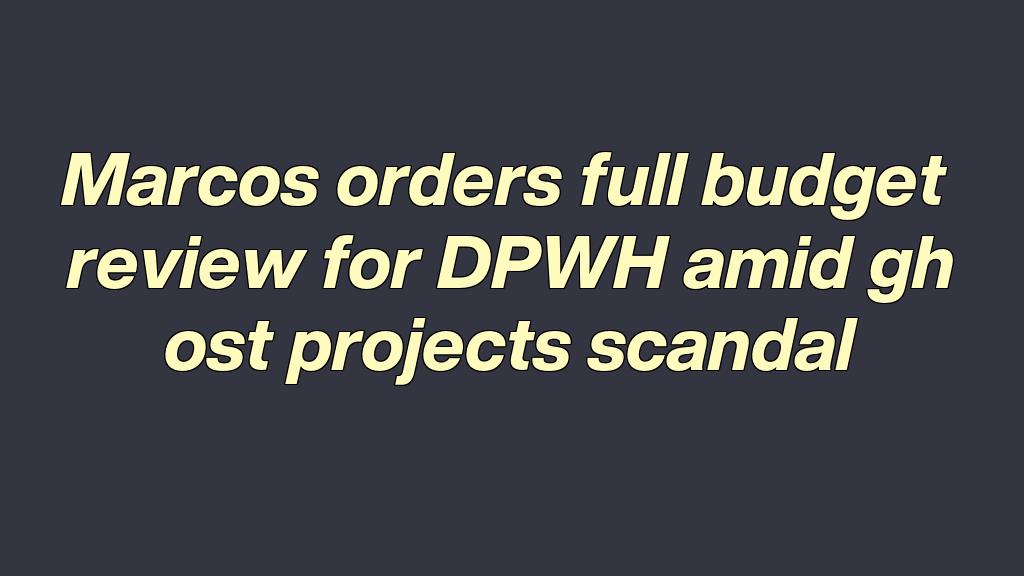(UPDATE) PRESIDENT Ferdinand Marcos Jr. ordered a sweeping review of the proposed budget of the Department of Public Works and Highways (DPWH) under the 2026 National Expenditure Program (NEP), Malacañang said Wednesday.
The order comes amid the government’s ongoing investigation into corruption in flood control projects and Congress’ deliberation of the proposed P6.793-trillion spending plan for next year.

In a press conference, Palace Press Officer Claire Castro said the President directed Budget Secretary Amenah Pangandaman and Public Works Secretary Vince Dizon to lead and expedite the review to avoid delays in budget deliberations.
“The President emphasized that the review must lead to necessary changes to guarantee transparency, accountability and the proper use of the people’s money, ensuring that resources are directed toward infrastructure projects that genuinely serve and benefit the Filipino people,” she added.
Dizon vowed to complete the budget revision within two weeks.
“I talked with the secretary of the Department of Budget and Management (DBM), and we both agreed on a two-week timeline,” he added.
Castro said that if the DBM and DPWH discover anomalous projects in the agency’s proposed budget, these would be removed through “errata,” and Congress would be informed that such projects should be excluded from the DPWH’s budget.
“The DBM said the NEP cannot be returned to them. Probably, there will only be an erratum. It will be corrected, amended or deleted. And the Senate and Congress will be given a list of what should no longer be included,” she said.
Marcos orders full budget review for DPWH amid ghost projects scandal
She added that the assessment would be completed as soon as possible to avoid delays in budget hearings and the possible reenactment of the budget.
“The President also does not want a reenacted budget,” Castro said.
The review came after Sen. Sherwin Gatchalian, who chairs the Senate Committee on Finance, flagged questionable entries in the proposed 2026 budget of the DPWH in the NEP during a committee hearing on Tuesday.
Among the “red flags” Gatchalian cited were projects with no station numbers, identical amounts, phased allocations, rounded figures, coded names and even the reappearance of 2025-funded projects.
In the NEP submitted by the executive branch to Congress, the DPWH received a P880.008 billion proposed allocation for next year, of which P250.825 billion will go to capital outlays for its flood management program.
The DPWH is at the center of the controversy over alleged irregularities and corruption in the implementation of flood control projects, especially after Marcos himself discovered that several projects were never built at all despite the contractor having been paid for the services, while other projects were poorly done.
On Monday, Marcos said that even the 2026 NEP contained questionable allocations that need to be properly addressed.
“The more we look, the more we find. Even in the 2026 budget, there are several insertions. So... it really needs to be cleaned out properly,” Marcos said.
The President has also tasked Dizon to conduct a “full organizational sweep” of the agency and ensure that public funds are used solely for infrastructure projects in the country.
The NEP, or the executive branch’s proposed budget, is submitted to Congress to be scrutinized as both the Senate and the House of Representatives craft the General Appropriations Bill for the following year.
Castro said the Marcos administration welcomed the call of Senate President Francis Escudero for Malacañang to come up with a “negative list” of infrastructure projects that cannot be funded under the proposed P6.793-trillion national budget for next year.
Stronger tracking needed
Meanwhile, Sen. Panfilo Lacson has asked the DBM whether it has the technology to track changes in the crafting of the national budget.
The senator on Tuesday said the Senate has set up a system to track changes in the budget, although he was not sure if the House of Representatives has one.
“Is there any current technology available to keep your system transparent yet secure, to enable us in both houses of Congress to track movements of the budget, from what is provided by the National Expenditure Program and going forward, to track who proposed which amendments to the General Appropriations Act?” he said in English and FIlipino at the briefing of the Development Budget Coordination Committee.
Budget Secretary Amenah Pangandaman said they have the capability to track changes from the NEP to the GAA, but may not be able to see the proponents of amendments unless they are provided minutes of the proceedings.
Marcos orders full budget review for DPWH amid ghost projects scandal
Pangandaman suggested that the Senate, House and DBM sign an agreement allowing their systems to communicate with each other.
Lacson also suggested that the DBM expand its digital budget management road map, including Project TINA (Technical Innovations in the National Expenditure Program Application), which aims to replace the existing NEP generation tool., This news data comes from:http://redcanaco.com
- Motorist in San Juan traffic spat faces sanction
- Malacañang calls plot to jail VP Duterte 'wild imagination'
- DPWH chief rejects calls to resign as he vows to probe corruption in flood control projects
- SpaceX cancels Starship megarocket launch in latest setback
- Trump moves to end US tariff exemption for small packages
- Thai court dismisses prime minister over compromising phone call with Cambodian leader
- Discaya’s construction companies competed against each other during biddings
- Thai Court: PM Shinawatra violated ethics rules
- US senators to reinforce 'partnership' with Taiwan
- AFP: It would take more than a tugboat to tow BRP Sierra Madre from Ayungin Shoal